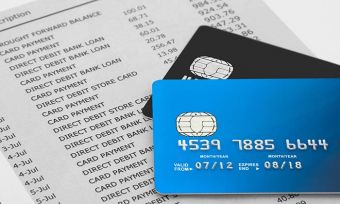It’s no surprise an increasing number of us are using credit cards over cash. Gone are the days of rifling around in our pockets for notes and coins. The introduction of instant tap payments have been a game changer. And with COVID-19’s spread has come a new development: the limit on contactless payments has increased.
Recently banks, Visa and Mastercard have increased the limit on contactless card payments from $80 to $200, to encourage consumers not to touch payment terminals and risk the spread of the coronavirus. The move mirrors a similar step in Australia, where the limit was doubled to AU$200. And although the measure is only temporary, it’s just one more shift towards a society where cash is no longer king.
Since the widespread introduction of debit cards in the mid-1990s, we’ve enthusiastically embraced card purchases, as covered in our story: Will coin still have capital in a cashless society? But what if you’re new to the credit card game?
If you’re considering signing up for your first credit card, there are a few things you should be aware of. Here we answer six simple questions that you might need answering if you’re new to the world of credit cards.
1. What exactly is a credit card?
A credit card works much in the same way a debit card does, with a key difference being you don’t need to have the funds available in your account, as you make use of a line of credit instead. This means you borrow money from the company that issued you the card to pay for any purchases you make on it. When you pay with your credit card, the amount is charged and then at the end of each billing period (usually each month), the card issuer will send you an invoice. You will then normally have a set grace period to pay off the balance before interest begins to accrue.
2. What types of credit cards are there?
There are many different credit cards out there, each designed to suit a certain purpose/use or person. Due to this, each card comes with different minimum and maximum credit limits. Your credit limit is simply the maximum amount you are able to have owing on your credit card at any time. Credit limits generally vary from around $1,000 to $10,000, but can be higher depending on the card. The specific credit limit on your card is typically decided by the lender based on information you provide as part of your application.
Some cards are designed to be used in emergencies only, and may have a lower credit limit, lower interest rate, and a relatively low annual fee compared to other credit cards.
Others have higher limits, rates and fees, and are designed for everyday use, such as convenience purchases and regular shopping (think groceries and fuel). They may also be used for larger purchases to allow the item to be paid off over an extended period of time, with the associated interest applied. However, you would need to consider whether a credit card is a suitable way of covering larger costs, as the interest you might pay could make it an expensive way of funding a purchase, compared to, say, using your savings.
Many cards offer perks, such as rewards points or frequent flyer air miles that accumulate as you use your card for qualifying purchases, although these cards also tend to come with relatively high rates and fees.
Compare Credit Cards for free with Canstar
3. How much will a credit card cost in rates and fees?
The main thing to remember when using a credit card is that unless you’re very careful about your spending, it can come with attached costs. There are things like the interest charged on unpaid balances each month, and annual fees to consider.
Annual fees are charged just for the convenience of having the card in your wallet, whether you use it or not. Interest costs can quickly accumulate if you don’t regularly pay off your balance each billing period, or when a low- or no-interest introductory rate period ends.
There are also a few other fees you should be aware of, including international transaction or exchange fees, cash advance rates/fees, as well as potential late payment fees.
When it comes to paying off your credit card, you have two options: pay it in full, or make the minimum repayment each month. By paying your credit card balance off in full, you’ll essentially wipe the slate clean, meaning you owe nothing and will have no interest accruing.
On the other hand, if you make only the minimum monthly repayments, you will avoid late payment fees, however, you will still accrue and pay interest on the remaining amount owing.
4. What are some of the benefits of using a credit card?
Depending on the credit card you choose, you may have access to a range of beneficial perks. When used appropriately, these perks can add up to a financial benefit that can offset or, in some cases, even exceed the cost of having the card.
Rewards points: Sometimes when you sign up for a rewards credit card there might be a special promotion that offers additional points for purchases, or a lump sum of bonus points, when you first take out the card. The easiest way to accumulate rewards points on an ongoing basis is to use your card for things you buy every day, and pay off balances before interest can be added. Depending on the card you choose, you may be able to exchange your points for plane tickets, gift cards or other items.
Insurance options: Many cards come with built-in insurance policies, with two of the most common types of cover offered being for travel, which can help provide financial protection for things such as your luggage going missing, or your trip being cancelled, as well as purchase protection insurance, which can help protect you if your purchase is lost, stolen, damaged, or goes on sale after you have bought it.
However, as with any insurance policy, it’s important to read the product disclosure statement (PDS) carefully, to work out whether the cover you receive meets your needs. For example, just because your credit card offers you some cover for travel related expenses, it doesn’t necessarily mean you would be covered for all the risks that could crop up on an overseas trip, and you might still want to consider a separate travel insurance policy for your journey.
Cash back: Some cards give a cash back reward, usually crediting your account with the money once a year. Many low-fee cash-back cards cap this amount at around $300, although some high-fee cards have no upper limit. The amount you earn is usually around 1% of your total spend.
5. How do you use a credit card responsibly?
Having a credit card can seem exciting, but remember that it represents a line of credit, not free money. Here are some tips to consider to help ensure you use your credit card responsibly.
- Firstly, before applying, it’s important to consider whether a credit card is the right choice for you and your current and future financial circumstances. One key thing to remember is that it can impact your credit score. Every time you submit an application for a credit card, it will show on your credit rating, regardless of whether you are approved or not. If you ever fail to meet a repayment, or get into financial distress with your credit card, this may also negatively impact your credit score.
- Keep any spending on your credit card in line with your actual budget, so you can pay off your balance easily at the end of each month.
- If you need to use your card for an emergency, pay off the balance as quickly as possible to reduce interest accumulation.
- Set a sensible limit; if you feel you might spend too much, discuss lowering your credit limit with the card issuer.
- Be careful with cash advances (using your credit card to withdraw cash – from an ATM, for example), as they are often subject to a higher rate of interest and aren’t included on no-interest rate grace periods.
6. Do you really need a credit card?
Before you sign up for a credit card, think about whether or not you really need one. If you only want one for convenience or think you’d struggle to pay off your spending in full each month, you might find that the cost of having a credit card outweighs its benefits. However, if you need a credit card for emergencies, or feel that you can leverage rewards programs to your advantage, a credit card could be a good idea for you.
Enjoy reading this article?
Sign up to receive more news like this straight to your inbox.
By subscribing you agree to the Canstar Privacy Policy






Share this article